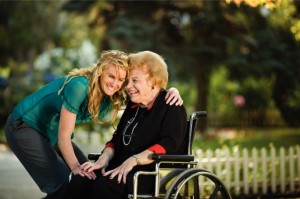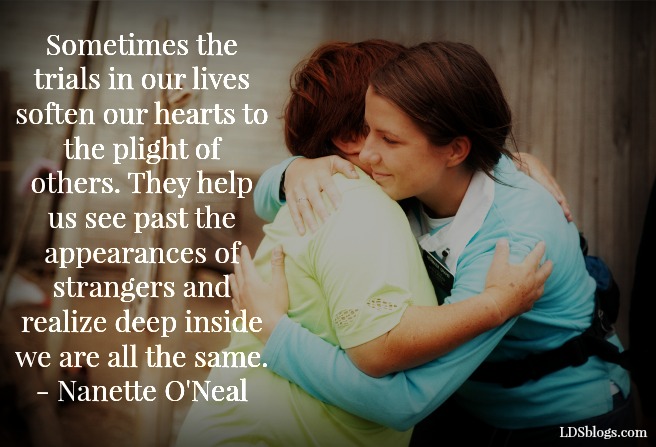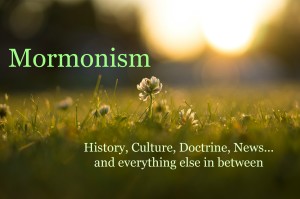After seeing my first Broadway musical when I was twelve, my grandmother and I stood on a dark street corner in New York, trying to hail a cab to the bus station. We were tired and it was cold and rainy. We were not dressed for the elements nor were we prepared for the strange nuances of the city as dusk moved in. A shabbily dressed man was making his way toward us, and my worried grandmother pulled me closer, waving her hand again at the passing cabs. No one would stop to pick us up. The vagrant man hastened his pace, coming up on us quickly. Before we could react, he crossed in front of us and stepped out in the street. His large stature and bold gesture instantly stopped the very next cab. He opened the back door, turned to my grandmother and said, “Ma’am, please, be my guest.” Suddenly that disheveled man became our savior. We smiled in relief and gratitude, scooted in the cab and never saw him again.
“Blessed are the poor in spirit; for theirs is the kingdom of heaven.” (Matthew 5:3)
 When do we learn to mistrust a person based on his appearance? It happens all too often, sometimes from our environment, other times through bad experiences we can’t let go of. But it doesn’t have to happen at all if we learn at an early age to see good and evil through behavior rather than appearance. The teacher of a class of primary age children asked a question this past Sunday—how are people different from each other? The very little ones under the age of five, with limited life experience and child-like thoughts, started the list with things like hair color, skin color and size. The older group, who met separately from the younger ones, ignored physical attributes completely when they made their list. They included things like talents, personality and behavior. I was amazed over the maturity of their thinking process. At such a young age, between seven and eleven years old, they had already learned to look beyond the physical, to notice differences in qualities over appearance. Little children see past the physical more often than adults. If they can continue to see this way, they can learn to act according to their keen insight.
When do we learn to mistrust a person based on his appearance? It happens all too often, sometimes from our environment, other times through bad experiences we can’t let go of. But it doesn’t have to happen at all if we learn at an early age to see good and evil through behavior rather than appearance. The teacher of a class of primary age children asked a question this past Sunday—how are people different from each other? The very little ones under the age of five, with limited life experience and child-like thoughts, started the list with things like hair color, skin color and size. The older group, who met separately from the younger ones, ignored physical attributes completely when they made their list. They included things like talents, personality and behavior. I was amazed over the maturity of their thinking process. At such a young age, between seven and eleven years old, they had already learned to look beyond the physical, to notice differences in qualities over appearance. Little children see past the physical more often than adults. If they can continue to see this way, they can learn to act according to their keen insight.
“Blessed are the pure in heart; for they shall see God.” (Matthew 5:8)
 When we see past the differences in people, we realize we are so much more similar to each other than we are different. Barriers are broken and kindness pours out from our souls. Kindness can have a ripple effect as well. I’ll never forget an incident in the life of my best friend from high school. She had been through some heart-wrenching trials. Her mother died, she lost her job, and she was losing her house. She was living at the poverty level for a time. She struggled daily to make ends meet. Friends and strangers alike seemed to come out of the woodwork to help her. As she slowly began to put her life together she remembered what it was like to be without. She vowed to return the kindness she had been blessed to receive during her darkest days. One night when she was at the grocery store making a purchase, a young couple in front of her was counting their change to pay the bill. They came up short, so they were trying to decide what to remove from their order. Before a decision could be reached, my best friend stepped in and handed the checker a ten dollar bill. She told the couple she had been in their shoes before so she knew what they were going through. The woman began to cry and so did my best friend. She told her how so many people had come to her aid in times of trouble, strangers out of nowhere, life-long friends; she couldn’t help to return the favor. The couple asked for her address to return the money and my friend replied, “Just do the same for someone else someday.” Neither party knew each other. But they were able to overlook their differences—in this case, economic differences—and treat each other with mercy.
When we see past the differences in people, we realize we are so much more similar to each other than we are different. Barriers are broken and kindness pours out from our souls. Kindness can have a ripple effect as well. I’ll never forget an incident in the life of my best friend from high school. She had been through some heart-wrenching trials. Her mother died, she lost her job, and she was losing her house. She was living at the poverty level for a time. She struggled daily to make ends meet. Friends and strangers alike seemed to come out of the woodwork to help her. As she slowly began to put her life together she remembered what it was like to be without. She vowed to return the kindness she had been blessed to receive during her darkest days. One night when she was at the grocery store making a purchase, a young couple in front of her was counting their change to pay the bill. They came up short, so they were trying to decide what to remove from their order. Before a decision could be reached, my best friend stepped in and handed the checker a ten dollar bill. She told the couple she had been in their shoes before so she knew what they were going through. The woman began to cry and so did my best friend. She told her how so many people had come to her aid in times of trouble, strangers out of nowhere, life-long friends; she couldn’t help to return the favor. The couple asked for her address to return the money and my friend replied, “Just do the same for someone else someday.” Neither party knew each other. But they were able to overlook their differences—in this case, economic differences—and treat each other with mercy.
“Blessed are the merciful; for they shall obtain mercy.” (Matthew 5:7)
Sometimes the trials in our lives soften our hearts to the plight of others. They help us see past the appearances of strangers and realize deep inside we are all the same. The Bible has beautifully taught us of our heavenly origin. In Malachi 2:10, the question is asked, “Have we not all one father? Hath not one God created us?” Indeed the one father spoken of here is our Heavenly Father. In the New Testament, Paul taught further when he said, “The spirit itself beareth witness to our spirit, that we are the children of God.” (Romans 8:16). This is a humbling realization of our worth to God and even more so, the worth of all souls to Him as well. From this perspective, everyone we meet has the potential to be a “Christ on the street corner”—to lift us from our earthly struggles and to give us a reason to look upward again.
Nanette O’Neal loves the gospel and is very happy to share her testimony on LDS Blogs. She is a convert to the church and still feels the spirit burn strong within her heart. She graduated from Mason Gross School of the Arts with a degree in music education and has taught children and adults in the private and public sphere for over twenty years. Nanette continues to study the gospel and the art of writing. She writes weekly inspirational articles on her blog and is currently working on an LDS fantasy novel series, A Doorway Back to Forever. You can find her at NanetteONeal.blogspot.com. Nanette has a wonderful husband, talented son, and three beautiful dogs.





Great post.